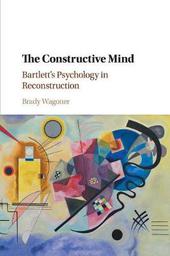
|
The Constructive Mind: Bartlett's Psychology in Reconstruction
Paperback / softback
Main Details
| Title |
The Constructive Mind: Bartlett's Psychology in Reconstruction
|
| Authors and Contributors |
By (author) Brady Wagoner
|
| Physical Properties |
| Format:Paperback / softback | | Pages:239 | | Dimensions(mm): Height 228,Width 151 |
|
| ISBN/Barcode |
9781108729697
|
| Classifications | Dewey:153 |
|---|
| Audience | | Professional & Vocational | |
|---|
| Illustrations |
Worked examples or Exercises; 8 Halftones, black and white; 2 Line drawings, black and white
|
|
Publishing Details |
| Publisher |
Cambridge University Press
|
| Imprint |
Cambridge University Press
|
| Publication Date |
17 January 2019 |
| Publication Country |
United Kingdom
|
Description
The Constructive Mind is an integrative study of the psychologist Frederic Bartlett's (1886-1969) life, work and legacy. Bartlett is most famous for the idea that remembering is constructive and for the concept of schema; for him, 'constructive' meant that human beings are future-oriented and flexibly adaptive to new circumstances. This book shows how his notion of construction is also central to understanding social psychology and cultural dynamics, as well as other psychological processes such as perceiving, imagining and thinking. Wagoner contextualises the development of Bartlett's key ideas in relation to his predecessors and contemporaries. Furthermore, he applies Bartlett's constructive analysis of cultural transmission in order to chart how his ideas were appropriated and transformed by others that followed. As such this book can also be read as a case study in the continuous reconstruction of ideas in science.
Author Biography
Brady Wagoner (Ph.D., University of Cambridge) is Professor of Psychology at Aalborg University, Denmark. His research focuses on social and cultural psychology, constructive remembering, social change and the development of dynamic methodologies. He was the co-creator of the Sir Frederic Bartlett Internet Archive and is associate editor for the journals Culture and Psychology and Peace and Conflict. He has over eighty publications, including eight books, and has received a number of prestigious professional awards, such as the Sigmund Koch Prize in 2009 and the Gates Cambridge Scholarship in 2005. He is the editor of Handbook of Culture and Memory (2017).
Reviews'In this comprehensive and insightful book, Brady Wagoner deftly analyses the progression of Bartlett's work. This is no mere re-evaluation - Wagoner renders Bartlett as a contemporary thinker, and a force for renewal in psychology.' Steven D. Brown, University of Leicester 'Brady Wagoner brilliantly re-examines Bartlett's life, science, and influence in this scholarly and deeply engaged book. Part fascinating scientific biography, part impassioned plea for a more open, context-sensitive experimental psychology, this is essential reading for all students of memory, mind, and culture.' John Sutton, Macquarie University, Sydney 'Wagoner delivers an engaging, insightful, and provocative analysis of Bartlett's life and work. This important book connects historical perspectives with contemporary issues, forcefully reminding us how Bartlett's insights remain crucial today.' Daniel L. Schacter, Harvard University, Massachusetts '... essential reading for scholars of memory, but also is a helpful, quick (and fun) read for all those whose work in some way is impacted by Bartlett's oeuvre.' Grant J. Rich, PsychCRITICS 'Brady Wagoner's The Constructive Mind: Bartlett's Psychology in Reconstruction is an impressive scholarly achievement ... Wagoner's book is also a provocative and important one, that underscores the way in which academic psychology has appropriated - and misappropriated - significant ideas, in the service of its own ideological ends. ... For those who do not know his work, it may be a startling revelation of what psychology might have been had it followed Bartlett's path rather than the decidedly more reductive one it in fact pursued. ... it is a significant contribution to the history of the behavioral sciences and a valuable corrective to those too-well-circulated stories that serve to shore up psychology's ill-conceived ambition to cordon off human behavior from the messy stuff of social life.' Mark Freeman, Journal of the History of the Behavioral Sciences '... the book is a very broad and interesting presentation of Bartlett as a theoretician who combined psychology with anthropology a century ago. The combination of the historical and the presentist aims is successful ...' Csaba Pleh, Culture & Psychology
|